Frederick Smith, Lord Birkenhead
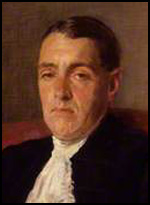
Frederick Smith, the son of a barrister, was born on 12th July 1872. His father, Frederick Smith, was mayor of Birkenhead, but died in 1888. Smith was educated at Sandringham School in Southport but after having failed the entrance exam for Harrow School, he went to Birkenhead School (1887–9). He won a scholarship to Wadham College in 1891.
While at Oxford University his contempries included Hilaire Belloc, C. B. Fry, John Simon and Francis Hirst. His biographer, John Campbell, has argued: "Despite the handicap of his northern background Smith outshone them all, endowing his bare initials with a glamour which lasted all his life. Tall, darkly handsome, unashamedly ambitious, endowed with a scathing wit and an inexhaustible appetite for life and pleasure, he made himself the epitome of the Oxford Union ‘swell’. His verbal duels with Hilaire Belloc were the stuff of Oxford legend. He switched from classics to law and became president of the union in his third year but still managed, by a heroic last-minute exertion, to take a first. The following year he won the coveted Vinerian law scholarship and was elected a fellow of Merton, where he stayed for three years (1896–9), gaining a depth of legal learning that later surprised critics who thought him merely a flashy politician."
Smith became a member of the Conservative Party and in the 1892 General Election he campaigned against Irish Home Rule. After passing his bar finals with distinction in 1899, he became a lawyer in Liverpool. In 1901 he married Margaret Eleanor Furneaux (1878–1968),. Over the next few years she gave birth to three children Eleanor, Frederick and Pamela. They purchased a house at The Grove, Thornton Hough. This was followed by a country house at Charlton, near Banbury.
A brilliant orator, Smith continued to be involved in local politics and after becoming the candidate for Walton won the seat in the 1906 General Election. The result was a Liberal Party landslide and was only one of only 157 tories facing more than 400 liberals in the new House of Commons. According to his biographer, John Campbell: "His maiden speech on 12 March 1906 - one of the most celebrated débuts in parliamentary history - was a masterpiece of impudent satire which made him a star overnight. He was shrewd enough not to try to repeat this first success, but followed it with a sequence of brilliantly argued speeches employing his forensic skills to portray the Liberal government's legislative programme as a series of cynical sops to the various sectional interests which made up its support. His speech on the 1906 Trade Disputes Bill remained the classic exposition of the case against intimidatory picketing and the legal immunity of trade unions right up to the 1980s. His clinical exposure of the anomalies of the education and licensing bills helped destroy the government's will to proceed with them when the House of Lords used its built-in Unionist majority to throw them out. As a sustained assault by a single junior back-bencher on the legitimacy of a government with a huge majority, Smith's achievement between 1906 and 1909 has never been surpassed."
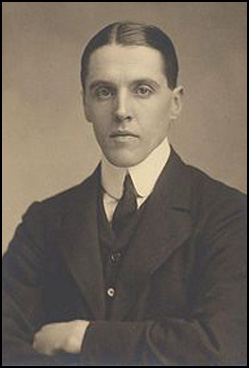
Smith became a barrister in 1908 and within a couple of years he was earning more than £10,000 per year. He developed a reputation for his witty comments in court. One day the judge told Smith: "You are extremely offensive, young man!". He replied: "As a matter of fact we both are; and the only difference between us is that I am trying to be, and you can't help it." On another occasion the judge complained about a long speech by Smith: "I've listened to you for an hour and I'm none wiser." He quickly responded: "None the wiser, perhaps, my lord but certainly better informed."
He successfully represented Lord Leverhulme (in a libel case against Lord Northcliffe), Arthur Ransome (in a libel case against Lord Alfred Douglas), and Ethel le Neve (the mistress of Dr Hawley Crippen). He also defended fellow politician, Horatio Bottomley in a series of cases before he was finally imprisoned. It is claimed that after every one of his successes he sent the newspaper reports to the headmaster of Harrow School. Smith's financial success enabled him to purchase a palatial London residence, 32 Grosvenor Gardens.
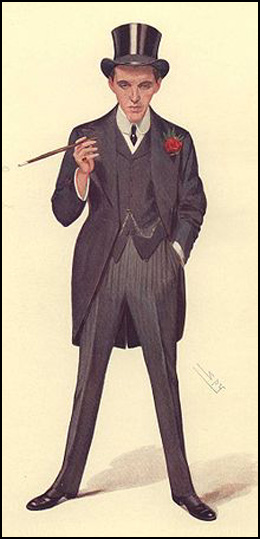
In 1909 David Lloyd George announced what became known as the People's Budget. This included increases in taxation. Whereas people on lower incomes were to pay 9d. in the pound, those on annual incomes of over £3,000 had to pay 1s. 2d. in the pound. Lloyd George also introduced a new supertax of 6d. in the pound for those earning £5000 a year. Other measures included an increase in death duties on the estates of the rich and heavy taxes on profits gained from the ownership and sale of property. Other innovations in Lloyd George's budget included labour exchanges and a children's allowance on income tax. Ramsay MacDonald argued that the Labour Party should fully support the budget. "Mr. Lloyd George's Budget, classified property into individual and social, incomes into earned and unearned, and followers more closely the theorical contentions of Socialism and sound economics than any previous Budget has done."
The Conservatives, who had a large majority in the House of Lords, objected to this attempt to redistribute wealth, and made it clear that they intended to block these proposals. Lloyd George reacted by touring the country making speeches in working-class areas on behalf of the budget and portraying the nobility as men who were using their privileged position to stop the poor from receiving their old age pensions.
Smith was chosen to defend the rights of the Lords to halt government legislation. John Campbell has pointed out: "He quickly forced himself to the forefront of the constitutional battle. Privately he thought the peers wrong to reject the budget. But publicly, as a good barrister, he made a brilliant case for their right to do so, turning the ‘peers v. people’ argument on its head by mounting an ingenious defence of the upper house as the trustee of the popular will against the otherwise unchecked arrogance of the Commons. Unlike the tory peers whose main concern was to preserve their own privileges, Smith saw that the existing composition of the Lords was indefensible."
After a long struggle with the House of Lords Lloyd George finally got his budget through parliament. With the Lords extremely unpopular with the British people, the Liberal government decided to take action to reduce its powers. The 1911 Parliament Act drastically cut the powers of the Lords. They were no longer allowed to prevent the passage of 'money bills' and it also restricted their ability to delay other legislation to three sessions of parliament.
When the Lords attempted to stop this bill's passage, the Prime Minister, Henry Asquith, appealed to George V for help. Asquith, who had just obtained a victory in the 1910 General Election, was in a strong position, and the king agreed that if necessary he would create 250 new Liberal peers to remove the Conservative majority in the Lords. Faced with the prospect of a House of Lords with a permanent Liberal majority, the Conservatives agreed to let the 1911 Parliament Act to become law.
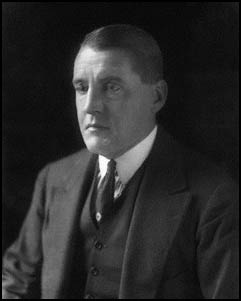
However, during the dispute, Smith had enhanced his political reputation. It has been claimed that Smith was trying to position himself to replace Andrew Bonar Law as leader of the Conservative Party. He presented himself as a progressive modern Conservative. He supported the payment of MPs, to allow Labour Party members to sit in parliament without being dependent on the unions. He also advocated proportional representation, to end the distortions of the existing electoral system. He supported Lloyd George's national insurance scheme and advocated a minimum wage.
One of Smith's closest friends in the House of Commons was Winston Churchill. At the time Churchill was a Liberal Party MP but despite their political arguments in public they enjoyed one another's company in private. This included the founding their own dining club - the Other Club. Rule 12 declared: "Nothing in the rules or intercourse of the Club shall interfere with the rancour or asperity of party politics". Although they disagreed on many issues, they both shared the view that women's suffrage should be opposed.
On the outbreak of the First World War Smith was expected, as a member of the Oxfordshire Yeomanry, to join the British Army. Instead, he accepted the offer of Herbert Henry Asquith to take responsibility for censoring newspaper reports on the fighting. As John Campbell points out: "On the outbreak of war in August 1914 Smith was appointed to the spectacularly inappropriate job of press censor. He was not a success, and lasted only a few weeks. Instead of joining his regiment, however - the Oxfordshire yeomanry, with whom he and Churchill had enjoyed playing soldiers before the war - he secured another incongruous appointment as recording officer to the Indian troops arriving in Europe to fight on the western front. This was a convenient posting which enabled him to observe conditions in the trenches from a position of some personal comfort behind the lines; it exposed him to justified criticism that he was shirking the military duty he was keen to urge on others."
In May, 1915, Prime Minister Asquith appointed Frederick Smith as Solicitor-General in his coalition government. He was promoted to Attorney-General five months later. It has been argued that "becoming solicitor-general diverted him from the political mainstream into the backwater of the legal offices". His chances of becoming the next leader of the Conservative Party faded. Smith's unwillingness to serve in the armed forces while prosecuting offenders under the Defence of the Realm Act, also seriously damaged his political career. His role in prosecuting Sir Roger Casement for treason also damaged his reputation. It was widely believed that Smith conspired to blacken Casement's name by circulating his homosexual diaries, in a vindictive determination to secure a conviction.
Winston Churchill introduced Smith to his cousin, Clare Sheridan. They soon became lovers. Her mother, Clarita Frewin, wrote to Leonie Leslie about the relationship: "The poor darling does not realise how people enjoy saying unkind things. It is getting to be quite a scandal but Jennie just laughs-she says Clare needs that sort of man to perk her up. I begged her to ask Winston to speak to F.E. (Smith) about it but she says he does not care. He adores Clare, thinks she can do no wrong after all she has suffered and he is devoted to Lord B.-you know how he always stands by his friends. So whatever scandal these two create together is in Winston's view no scandal-they are splendid, and whatever they feel like doing is perfect." When her mother complained to her about the public scandal of the affair she replied: "I am thirty-five this year and what haven't I been through - this is a happy interlude.... You think in such old-fashioned terms. I don't regard this as a love affair. I'm just enjoying a man's company." Jennie Churchill commented: "You will be careful dear? After all he has a wife and children." Clare replied: "Honestly I know that - I'm doing a head of his daughter Eleanor. She is fascinating."
Smith's Walton seat was abolished by boundary changes; but he was comfortably returned for neighbouring West Derby in the 1918 General Election. Prime Minister David Lloyd George offered Smith the post of lord chancellor. This meant leaving the House of Commons and giving up his lucrative legal work. It was a controversial decision as he was known for his hedonistic lifestyle and his affairs with women and King George V asked Lloyd George to reconsider the decision. However, he refused to back down and Smith became at forty-six, the youngest holder of the office since George Jeffreys in 1685.
Frederick Smith took the title Lord Birkenhead on 3rd February 1919. John Campbell has pointed out: "He relished the magnificence of the office, but was impatient of the ceremonial flummery, the knee-breeches, and the long hours sitting on the woolsack. He very quickly quashed doubts about his legal ability: this was when his years of academic law at Merton paid their dividend. He firmly defended the independence of the judiciary against political encroachment. His judgments were greatly admired, and he pushed through an important agenda of reforms. At the same time he brought an informality to the office and a whiff of brimstone to the soporific proceedings of the Lords. And on occasion - particularly as he began to get bored with the job and realized that no further advancement was open to him - he began to disgrace himself in public. He had always been a formidable drinker, but before the war ambition ensured that he could hold his liquor. Once he became lord chancellor he had no realizable ambition left.... In drink he could be rude and bullying. So in the end some of the doubts about his suitability were vindicated."
David Lloyd George considered Lord Birkenhead as an important political advisor: "He was cautious as well as sagacious, remarkable for his lucidity and brevity… a master of words". Birkenhead played an important role in the creation of the Irish Free State in December 1921. This involved in him persuading the Conservative Party to accept a settlement which many saw as giving in to terrorism. On the other hand, he convinced the Irish to compromise their demand for a thirty-two-county republic. In particular he forged a surprising bond of mutual trust with the IRA leader, Michael Collins, who believed he had signed his own death warrant by signing the treaty. Collins also predicted that "Birkenhead may have said an end to his political life" by promoting the treaty.
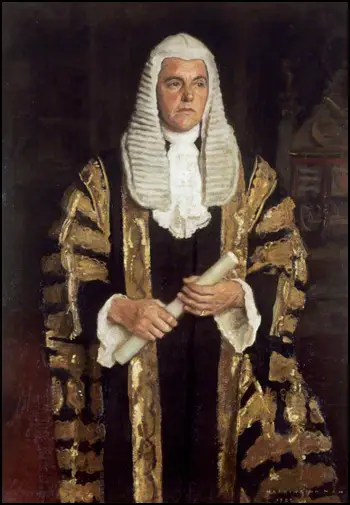
On 28th November, 1922, he became the Earl of Birkenhead. Worried by the events of the Russian Revolution, he supported Lloyd George's attempt to merge his Coalition Liberals with the Conservative Party in a single anti-socialist party. By this time he had lost all influence in his party and in October 1922 MPs voted at the Carlton Club to end the coalition. The new prime minister, Stanley Baldwin, did not offer Birkenhead a post in his government.
Out of office, Birkenhead controversially suggested an agressive imperialist foreign policy. One critic has described it as a "neo-Darwinian view of international conflict". On 7th November, 1923, Birkenhead told the students of Glasgow University: "Politically, economically and philosophically the motive of self-interest not only is but must... and ought to be the mainspring of human conduct... For as long a time as the records of history have been preserved human societies passed through a ceaseless process of evolution and adjustment. This process has sometimes been pacific, but more often it has resulted from warlike disturbance. The strength of different nations, measured in terms of arms, varies from century to century. The world continues to offer glittering prizes to those who have stout hearts and sharp swords; it is therefore extremely improbable that the experience of future ages will differ in any material respect from that which has happened since the twilight of the human race.... it is for us who, in our history have proved ourselves a martial... people... to maintain in our own hands the adequate means for our own protection and... to march with heads erect and bright eyes along the road of our imperial destiny."
Lord Birkenhead's attitude towards the British Empire and trade unions convinced many that he was an out of touch reactionary. For example, the cartoonist David Low, caricatured him as Lord Burstinghead. However, one young student, John Masterman, a friend of his son, commented after meeting him: "His was, I am convinced, the most powerful mind with which I have ever been brought into contact".
After the fall of Ramsay MacDonald and the Labour Government in October, 1924, Baldwin was anxious to reunite the party. To the disapproval of some traditionalists he brought back into his government not only Austen Chamberlain as foreign secretary and Winston Churchill as chancellor of the exchequer, but also Lord Birkenhead as secretary of state for India. In this position he argued strongly that the Indian people were not ready for self-government. According to his parliamentary private secretary Birkenhead did not spend much time on the job: "We seemed to play an awful lot of golf"
Lord Birkenhead had developed very hostile views towards the trade unions and took a prominent role in the government's negotiations with the Trade Union Congress to try to avert the 1926 General Strike. On the 7th May, Sir Herbert Samuel, Chairman of the Royal Commission on the Coal Industry, approached the TUC and offered to help bring the strike to an end. Without telling the miners, the TUC negotiating committee met Samuel and worked out a set of proposals to end the General Strike. These included: (1) a National Wages Board with an independent chairman; (2) a minimum wage for all colliery workers; (3) workers displaced by pit closures to be given alternative employment; (4) the wages subsidy to be renewed while negotiations continued. However, Samuel warned that subsequent negotiations would probably mean a reduction in wages. These terms were accepted by the TUC negotiating committee, but were rejected by the executive of the Miners' Federation. Lord Birkenhead commented: "It would be possible to say without exaggeration that the miners' leaders were the stupidest men in England if we had not frequent occasion to meet the owners."
On the 11th May, at a meeting of the Trade Union Congress General Committee, it was decided to accept the terms proposed by Herbert Samuel and to call off the General Strike. The following day, the TUC General Council visited 10 Downing Street to announce to the British Government that the General Strike was over. At the same meeting the TUC attempted to persuade the Government to support the Samuel proposals and to offer a guarantee that there would be no victimization of strikers. This the Government refused to do. Lord Birkenhead, wrote later, the TUC's surrender was "so humiliating that some instinctive breeding made one unwilling even to look at them."
Birkenhead helped draft the 1927 Trades Disputes Act. This legislation outlawed general strikes and sympathetic strikes, and banned civil servants from joining unions affiliated to the Trade Union Congress. This act also hurt the Labour Party by forcing union members to make a positive decision to pay a levy to a political party. Instead of "contracting out" as stipulated by the 1913 Trade Union Act, union members had to "contract in". As a result of this legislation, the Labour Party lost about a third of its subscriptions.
Lord Birkenhead died of died of bronchial pneumonia at his London home, 32 Grosvenor Gardens, on 30th September 1930, deeply in debt. The historian, Mark Almond, has suggested that he "drank himself to death".
Primary Sources
(1) Frederick Smith, speech in the House of Commons (30th March, 1906)
We are asked to permit a hundred men to go round to the house of a man who wishes to exercise the common law right in this country to sell his labour where and when he chooses, and to 'advise' him or 'peacefully persuade' him not to work. If peaceful persuasion is the real object, why are a hundred men required to do it? Every honest man knows why trade unions insist on the right to a strong numerical picket. It is because they rely for their objects neither on peacefulness nor persuasion. Those whom they picket cannot be peacefully persuaded. They understand with great precision their own objects, and their own interests, and they are not in the least likely to be persuaded by the representatives of trade unions, with different objects and different interests. But, though arguments may never persuade them, numbers may easily intimidate them. And it is just because argument has failed, and intimidation has succeeded, that the Labour Party insists upon its right to picket unlimited in respect of numbers.
(2) Frederick Smith, speech to students at Glasgow University (7th November, 1923)
Politically, economically and philosophically the motive of self-interest not only is but must... and ought to be the mainspring of human conduct... For as long a time as the records of history have been preserved human societies passed through a ceaseless process of evolution and adjustment. This process has sometimes been pacific, but more often it has resulted from warlike disturbance. The strength of different nations, measured in terms of arms, varies from century to century. The world continues to offer glittering prizes to those who have stout hearts and sharp swords; it is therefore extremely improbable that the experience of future ages will differ in any material respect from that which has happened since the twilight of the human race.... it is for us who, in our history have proved ourselves a martial... people... to maintain in our own hands the adequate means for our own protection and... to march with heads erect and bright eyes along the road of our imperial destiny.
(3) Frederick Smith, Future of the Conservative Party (1913)
WWe stand for the State and for the unity which, whether in the form of kingdom or empire or class solidarity, the State alone can bring. Above all stands the State and in that phrase lies the essence of Toryism. Our ancestors left it to us, and not the least potent method of preserving it is to link the conception of State Toryism with the practice of Social Reform.
(4) Clare Sheridan, Naked Truth (1927)
Birkenhead, who had been painted by every artist in London was self-appointed critic. Sometimes McEvoy joined the party and would try to paint Winston while Winston painted me, and I modelled him. No one would keep still for the other, and it was small wonder that no one got very far. Of all the portraits I have ever done Winston's was the hardest, not because his face was difficult, but because it was for him a physical impossibility to remain still. He said that Sunday was his only day in the week to paint, and so I waited, I watched, I snatched at times and moments, I did and undid and re-did, at times in despair. Freddy would come in, beseech him to "give her a chance" and "it's for me, Winston," and Winston would be contrite and promise and say he was sorry and that he knew it was hard on me, and he would sit compassionately for three minutes and then begin to fidget. Not only would he not keep still for me, but more usually he expected me to keep still for him! Once a secretary arrived from the War Office with a locked despatch box. He stood there, but Winston went on painting, neither seeing nor hearing. For some time the secretary watched us both; I looked at him wondering what he thought, and saw that he was smiling.
